The seventh chapter of a podcast series on the first Book of Maccabees.
For more content from VISION Magazine, subscribe to our newsletter and follow us on Twitter @VISION_Mag_, Facebook and YouTube. If you haven’t already, don’t forget to subscribe to our podcast on SoundCloud, iTunes, Stitcher, TuneIn, or Spotify and leave a rating and review to help us get our message out to a wider audience!
To support the podcast, head over to our PayPal portal and be sure to write a note that your contribution is for the podcast.
Hosted by: Robert Goodman
Transcript:
Shalom Aleikhem! And welcome back to Sefer Maccabim!
Last time we learnt about the Maccabees’ first defeat at the battle of Beit Zekharia where Elazar ben Matityahu was crushed by an elephant he slayed, and the subsequent Seleucid siege of Yerushalayim that was lifted on the 28th of Shvat after Lysias had to return to Antioch to put down Phillip, who had seized the throne.
But speaking of seizing the throne, in chapter 7 we now have some new developments.
Remember the Treaty of Apamea we covered in chapter 6, which the Romans forced the Greeks to sign? Well one condition of the treaty we didn’t mention was that the Seleucids were required to hand over twenty members of their royal court to Rome, who would remain there as hostages. This of course was a way of ensuring the Seleucids would obey Roman orders.
One of these hostages was a man named Demetrius, who was a first cousin of the present king Antiochus V (they shared a common grandfather, Antiochus III, father of Antiochus Epiphanes). Demetrius is sent to Rome and grows up as a hostage there. Now when Antiochus IV dies and is succeeded by his son Antiochus V, Demetrius sees this as unfair and believes he has a better claim to the throne, because his father, Seleucus IV, was the original successor of their grandfather, Antiochus III, but Seleucus was murdered by his finance minister, and although Antiochus Epiphanes, brother of Seleucus, killed the usurper, he then went on to usurp the throne himself, and only because of this is Antiochus V currently on the throne, and not Demetrius.
Demetrius tries to convince the Roman Senate to release him and restore the Seleucid throne to him, but the Romans refuse his request. Why? Remember Antiochus V is only 9 years old at this time, whereas Demetrius is 22 and a fully grown man, and the Senate believe that Seleucid Greece should be ruled by a boy rather than a man, presumably because this makes them easier to control.
Later, after the battle of Beit Zekharia we covered in the previous chapter, Rome sent an emissary to punish Antiochus V for violating the terms of the treaty – remember it forbade them from using elephants – and the emissary comes to sink his ships and hamstring his elephants, greatly weakening the boy king. In all the commotion, Demetrius escapes from confinement and makes his to Antioch, where he is welcomed back as king. He has his men immediately execute Lysias and Antiochus V, and has himself proclaimed as king over the Seleucid Empire.
What does this mean for the Jews? It means the deal Lysias made with the Jews, wherein Lysias would grant the Jews freedom of religion in exchange for them remaining a part of the empire – a deal which the Ḥassidim accepted but the Maccabim rejected – this deal no longer stands. This does seem to suggest that the Maccabi perspective of only being assured freedom of worship after achieving political independence in our own land – to be a more advanced perspective, certainly more so than that of the Ḥassidim, because if you simply accept any deal that allows you to live in peace based on the whims of a foreign ruler, what do you do if that ruler changes his mind?
Our sages taught us loud and clear in Pirkei Avos (2:3):
“הֱווּ זְהִירִין בָּרָשׁוּת, שֶׁאֵין מְקָרְבִין לוֹ לָאָדָם אֶלָּא לְצֹרֶךְ עַצְמָן. נִרְאִין כְּאוֹהֲבִין בִּשְׁעַת הֲנָאָתָן, וְאֵין עוֹמְדִין לוֹ לָאָדָם בִּשְׁעַת דָּחְקוֹ”
“Beware of rulers, for they do not befriend someone except for their own benefit. They appear friendly when it benefits them, but they do not stand by a person in his time of need.”
Once installed as king, Demetrius sends his general, named Bacchides, to solidify his rule in Judea. Bacchides comes to Yerushalayim, which is currently controlled by the Maccabim, he wrestles the city from them without much resistance, and then he appoints his own Kohen Gadol. Now this does seem like an awful flashback to the years before the revolt, when Antiochus Epiphanes installed the Hellenized Jew Menelaus as his own Kohen Gadol, who became Antiochus’s right-hand man in Hellenizing the Jewish population. It’s not quite so bad this time, however. To explain why, we have to appreciate that not all Hellenized Jews were Hellenized to the same extent. Menelaus was one of the more radical Hellenists, those Jews who dropped all traces of Torah observance and did their utmost to assimilate into Greek culture, who reversed their circumcisions and ran naked races in the gymnasia, and went out of their way to help the ruling Greeks Hellenize all Jews into their new culture. But not all Hellenized Jews went quite so far.
The Kohen Gadol appointed by Bacchides, a Jew named Eliyakim, or Alcimus as he calls himself, is part of a class of Jews who are more moderately Hellenized. These Jews remained loyal to Torah and mitzvot, but they saw the world through a Greek worldview. It’s important to realize that ever since the time of Noaḥ, Shem and Ever our ancestors always had a very unique, Hebrew worldview, they saw the world through a very unique value system, which as I learned from Rabbi Yehuda HaKohen, anyone who wants to learn how our ancestors perceived the world should learn the Kuzari, the fundamental work of Jewish thought written by Rabbi Yehuda HaLevi. Now, even though we had suffered exile since receiving the Torah, none of our captors tried to change us internally. The Assyrians and Babylonians displaced us from our home country, while Haman wanted to wipe us out physically.
The Greeks were the first ones to introduce foreign ideas into our worldview, the first ones to mess with the value system we inherited from our ancestors and to change the way we looked at the world. To give an example, the ancient Hebrews related to land and to nature as something very precious, something to forge a bond with, certainly to be used for farming but always to be treated with reverence and certainly not disrespected. I think the best example for this is Shmita, when every seventh year the land would have an opportunity to rejuvenate itself and we would be reminded that the land doesn’t really belong to us, but rather we belong to it.
The Greeks, however, related to land purely as something to be conquered, as real estate, as a currency. They saw no reason to respect the environment and invested much effort in building up the land they conquered in a bid to expand their empire as far as possible. And when Judea was absorbed into the Greek empire and we started intermingling with the Greeks, they introduced a lot of foreign ideas into our thinking and a lot of Jews absorbed these ideas. As a result, we have Jews who are still committed to observing Torah but see the world through a non-Jewish lens. The Romans later adopted the Greek values and way of thinking, and it developed into the outlook of Western civilization. And without meaning to offend anyone in the slightest, perhaps there’s a group of Jews today who parallel these moderate Hellenists, who are completely loyal to Torah and mitzvot but who see the world through a Western worldview as oppose to the way our ancestors have always seen the world for thousands of years. Perhaps we might call these Jews – modern orthodox?
Anyway, where were we? Oh yes, Bacchides has wrestled Yerushalayim from the Maccabim and appointed the moderate Hellenist Alcimus as Kohen Gadol. Alcimus is something of a compromise candidate – he is a legitimate Kohen, unlike his predecessor Menelaus who was from the tribe of Binyamin, and he’s seen as ‘Greek enough’ for the Syrian-Greeks and ‘Jewish enough’ for the Ḥassidim. The Maccabim don’t like him, because he was appointed by the empire, and we don’t accept a Kohen Gadol unless we appoint him ourselves. Nor does Alcimus like them; remember he sees the world through a Greek lens, and he essentially sees the Seleucid Empire as the good guys and the Maccabim as a bunch of fanatics.
So when a delegation of sixty Ḥassidim come to Yerushalayim to welcome Alcimus as Kohen Gadol, he suspects them of being on Yehuda’s side and has all sixty of them killed. This killing sends a shock through Judean society, especially among the Ḥassidim, they believed that the empire had made peace with them, but now they’re being killed again. As a result of this more Jews begin drifting over to Yehuda’s side, that the Syrian-Greek Empire is something to make war against, and not to cosy up to or make peace with. This feeling, I imagine, was intensified when Bacchides has to return to Antioch, but stops at the Jewish city of Beit Sokho, and massacres the inhabitants.
So Judean society is not unified. On one side you have those Jews aligned with Alcimus, the Hellenists with perhaps some of the more moderate Jews, and on the other side you have a lot of Jews aligned with Yehuda, the Maccabim and quite possibly more of the Ḥassidim. It’s not open warfare, but there’s friction between them. Alcimus looks at the country and he realizes there can never be peace as long as Yehuda is alive. So he goes to Demetrius and asks him to send forces to help him hunt down Yehuda HaMaccabi and get rid of him. Demetrius is happy to oblige and sends a general named Nikanor, who’s the commander of the elephant unit.
So general Nikanor comes to Judea and meets with Yehuda HaMaccabi, and there’s mutual respect between them. Both men, after all, are ferocious warriors, and they actually become friends. Nikanor even recommends Yehuda take a wife, start a family.
How do we understand Nikanor’s words? It’s important we do so because this will shed a lot of light on the conflict in Israel today and how it’s presented around the world. To understand Nikanor’s request we have to take a look at some more revolutionary theory. We touched on it back in chapter 3, but in any war of liberation there’s always the oppressor and the oppressed, and in the Maccabean revolt these roles are filled by the Seleucid Empire and the Jews respectively. Now in such a war, what does each side want? The oppressed want the occupier out of their land, to be free from foreign rule, and they are willing to make sacrifices to achieve this. The oppressor, on the other hand, is benefiting from his presence in this country by taxing and exploiting the oppressed population to take their goods and raw materials, and he would much rather things remain quiet so he can continue his milking the country and earning more money from it.
Therefore Nikanor is nudging Yehuda to basically retire, trying to tell him that “there’s nothing to fight for anymore, you have your freedom of worship, you can keep Shabbat, Brit Mila, Rosh Ḥodesh, we’re not forcing anything on you. What do you want to fight for, political independence? You know how many of you would die if you tried that? Things are ok, you’ll be ok as you are.” Because Nikanor’s job, as he sees it, is to keep the peace. In a conflict the oppressor wants change and justice and is willing to use violence to achieve this; the oppressor says “no, violence is bad, we just want peace.” What do they mean by peace? A non-violent version of the status quo.
And I’m going to say something controversial now, which is that I think this throws a lot of light on the situation regarding Israel advocacy on university campuses around the world. Jewish students advocating for Israel are often drowned out by hordes of other students calling to “Free Palestine, stop Israel apartheid, et cetera.”
Now some of these students, I’ll give you, deep down genuinely hate our people and what we stand for and truly want to see us wiped from the face of the earth, but disguise their hatred for Israel as support for Palestinians. Some of them really are “Amalekites in the garb of Canaanites.”
But I can’t believe that’s true about every single Palestinian supporter. Some of them actually are decent people at heart and want to bring about a progressive change in the world. They see the conflict in Israel on the news, they see Palestinians being mistreated at the hands of Israeli soldiers, and they instinctively sympathize with the Palestinians. They may not know anything about the history of our conflict, they only see one people being oppressed at the hands of another and instinctively want to stand with the oppressed people. Then they arrive at university and see the slogans being trumped by each side. They see the Palestinian supporters campaigning with messages like “end the unjust military occupation”, “stop settler colonialism in the Middle East”, in other words, messages advocating for progressive change. Then they turn to the Jews advocating for Israel, and what messages are being put forward from the Israeli side? “Israel just wants peace”, “Israel has amazing hi-tech”, “Israel produces great cherry tomatoes”. In other words, despite Jews being true natives of the land, we are presenting ourselves as if we were the colonizers. So these students see the messages being presented by both sides, and they think, “Oh! So these guys want justice and these guys want peace, so Israel must be the oppressors here,” and they join the pro-Palestinian movements.
This holds true not just for non-Jews but for many Jews who never received a proper education on these matters. And let’s be honest, the way we’re presenting ourselves – who can blame them?
Returning to our story. Nikanor tries to influence Yehuda to retire and start a family, as he believes he can achieve his goal of creating peace in the region if he can convince the leader of the revolution to step down. But Alcimus doesn’t agree: he believes there can only be peace in Judea if Yehuda is killed and the Maccabees are crushed. So Alcimus sends a message to Demetrius, saying, “Nikanor, whom you sent to Judea to hunt down Yehuda HaMaccabi, is not doing his job – he actually made peace with the enemy!”
So Demetrius summons Nikanor back to Antioch and scolds him: “I told you to hunt down Yehuda and kill him – what do you think you’re playing at? Go do what I told you to do!” So Nikanor returns to Judea, and when Yehuda next meets with him he senses something off about Nikanor’s behavior; his attitude towards Yehuda is not the same as before. So Yehuda, suspecting foul play, disappears. Nikanor is now under pressure from the emperor and goes out to fight Yehuda’s forces, but Yehuda beats him easily, and kills around five thousand of Nikanor’s men. Enraged, Nikanor marches into Jerusalem up to the Beit HaMikdash, points at the building, and the text tells us what happens next:
“וישבע שבועה לאמור אם לא תסגירו את יהודה ואת אנשיו בידי שרוף אשרוף את הבית הזה בשובי בשלום וילך בחרי אף”
“And he swore an oath saying, ‘unless Yehuda and his men are delivered into my hand, I will burn down this house!’ And he left in a great rage.”
Nikanor has actually threatened to destroy the Beit HaMikdash unless Yehuda is handed over to him. Now as we know, Nikanor clearly didn’t destroy the Beit HaMikdash; that role went to the Roman general Titus, who commanded the Romans forces who destroyed Yerushalayim around 200 years later. So what happened to Nikanor? Let’s find out.
This declaration of Nikanor means open war between the Seleucids and the Jews, and Yehuda starts mobilizing his soldiers to fight. But he has trouble galvanizing a force. Most of his soldiers have already returned to their houses, to their farms, to their villages, and it’s hard to convince them to leave their lives of calm again to return to the hills to fight. Only the most committed, around three thousand, answer the call. They gather in Adassa to prepare for battle, while Nikanor has gathered a huge army not far away in Beit Ḥoron, a location of one of Yehuda’s earlier battles. Nikanor and his soldiers are all united in their determination to fight Yehuda, but the Jewish camp, where the soldiers are fasting to prepare for the battle tomorrow, they’re still arguing among themselves. The Ḥassidim, remember, didn’t respond to Yehuda’s call to arms, and there’s still the debate going on as to whether they should be fighting to free Eretz Yisrael from foreign rule. The Ḥassidim, as we’ve mentioned previously, hold that they absolutely have an obligation to fight and die to be able to keep the Torah and live by the ways of their ancestors, but this can be done while living under foreign rule – it’s not necessary to die in order to liberate Eretz Yisrael. The Maccabim, on the other hand, agree they have an obligation to die to live by the ways of the Torah, but not just that – they also have a Torah obligation to liberate Eretz Yisrael from foreign rule. This makhloket is ongoing amid the Jewish camp.
That night, the night before the battle, Yehuda has a dream. (This dream is recounted by Yehuda in the 15th and final chapter of the second book of Maccabees, for anyone daring enough to try and translate the Hebrew on Sefaria.) In this dream, Yehuda is visited by a man named Ḥonio. Now Ḥonio was the last legitimate Kohen Gadol before Antiochus Epiphanes interfered with the Kehuna and installed Jason and then Menelaus as his Kohen Gadol. It’s possible that Ḥonio is also Yehuda’s grandfather; Yehuda’s father Matityahu was known as Matityahu ben Yoḥanan. Ḥonio is not too dissimilar from Yoḥanan, it’s possible they were the same person. Anyway, in this dream Ḥonio introduces Yehuda to another man, with silver hair, a man he’s told is none other than Yirmiyahu HaNavi, who prophesied to Am Yisrael at the time of the destruction of the first Beit HaMikdash some 300 years before. Yirmiyahu hands Yehuda a golden sword and tells him, “קח נא את החרב בידך, והכית בו את צורריך.” – “Take this sword in your hand and go and vanquish your enemies.”
Now this is a very significant dream because Yirmiyahu was likely the source the Ḥassidim were bringing against the Maccabim to prove they don’t have an obligation to fight against foreign rule. The essence of Yirmiyahu’s nevua was telling Am Yisrael, “the Beit HaMikdash is about to fall and you’re going to be taken captive in Babylon, by Nevukhadnetzar. While you’re there, don’t try to fight back, don’t try and regain independence, submit to Babylon’s rule for seventy years.” The Ḥassidim used this to show the Maccabim, “see, HaShem doesn’t want us to oppose foreign rule, he told us through his own navi that he wants us to submit!” But we know that if a navi comes and tells us to break halakha one time, we believe him. Back in ancient Israel when nevua was still common among us, the navi was like the wildcard – he could come along with a message from HaShem and say “HaShem commands us to do such and such an act!” and we would be forced to obey, even if HaShem’s command appears to contradict halakha. But only as a one-time event. If, on the other hand, a navi comes and tells us a mitzvah is no longer a mitzvah, he must be a false prophet and we don’t believe him.
Yirmiyahu’s nevua about the Babylonian exile was a one-time event. He was telling Bnei Yisrael to submit to foreign rule, but only this one time. Yirmiyahu giving Yehuda this golden sword was in essence him telling Yehuda, “Don’t allow the Ḥassidim to use my nevua as a weapon against me. Galut Bavel was a one-time event, when we were supposed to submit to the rule of Nevuchadnezzar, but that does not mean there is no longer a mitzvah to liberate Eretz Yisrael. Go forth and vanquish your foes, and the Kadosh Barukh Hu will be with you.”
The following day is the 13th of Adar, and Yehuda’s 3,000 soldiers go out to meet Nikanor’s 9,000. Many of the Jewish soldiers are scared upon seeing the numerical superiority of the Syrian-Greeks, but Yehuda delivers an inspirational talk to his men to strengthen them in the face of the impending battle, reminding them how in the days of Ḥizkiyahu HaMelekh the Assyrians besieged the city of Yerushalayim, but a destroying angel went out and slew 185,000 of them in one night. In doing so he is fulfilling a positive commandment, that before a Jewish army goes out to battle a kohen should address them, reminding them what they are fighting for, of the obligation to go out and fight HaShem’s wars and to fill them with emuna. In fact the Rambam writes in his Mishne Torah that it’s actually forbidden for a Jewish soldier to be afraid in battle.
Following his Divine pep talk Yehuda leads his soldiers into battle against Nikanor with an unmatched ferocity. Yehuda reaches Nikanor first and Nikanor is the first Seleucid slain in the battle. Once they see their commander dead, the other mercenaries lose heart and all flee, with Yehuda’s soldiers in hot pursuit. But what happens next is truly unbelievable: Jews from the surrounding villages see the mercenaries in flight and they pour down the sides of the valley they are fleeing through, trapping them, and with them in front and Yehuda’s men behind the Jews butcher the mercenaries, hacking at them and killing them one by one until every single mercenary from the original 9,000 has died. It’s a truly miraculous victory for the Jews.
The Jews rejoice, and take the spoils of war. Yehuda cuts off the head and right arm of the dead Nikanor (it’s possible Yehuda originally killed him with this strike, using the signature strike of the tribe of Gad we discussed in chapter 3). Yehuda then hangs Nikanor’s head and right arm on the walls of Yerushalayim, because Nikanor had stretched out his hand and pointed at the Beit HaMikdash, declaring he would destroy it. And the Rabbis declare a festival, that every year the day of the battle, the 13th of Adar, would be celebrated as a ḥag named Yom Nikanor, the festival of Nikanor. And that’s the end of chapter 7.
Before I go any further I just want to put it out there that much of the material in these last two shiurim on chapter 6 & 7 I gathered from a class by Rabbi Yehuda HaKohen on Yom Nikanor.
So this is really significant, what we’ve just learnt here – a yom tov on the Hebrew calendar that many of us might not even have been aware of until now. Indeed, when we think of the 13th of Adar we don’t generally think about Yom Nikanor, but rather of course about Taanit Esther, the fast of Esther that directly precedes Purim. So where did we lose track of Yom Nikanor?
We mentioned back in the introduction about how the Maccabean revolt introduced several new festivals onto our calendar, including the eight-day dedication ceremony following the victory at Beit Tzur, and the lifting of the siege around Yerushalayim on the 28th of Shvat. After the Romans destroyed the Beit HaMikdash most of these holidays were annulled by the sages, but two survived: The eight days of Ḥanukah, and this one, Yom Nikanor. Yom Nikanor was celebrated up until several hundred years later during the time of the Geonim, when it was more or less swept under the rug and replaced with the fast of Esther. But Yom Nikanor is now experiencing a revival in modern-day Israel. It’s true that the daytime is dedicated to the fast, but the previous night still provides an opportunity for Yom Nikanor celebrations. If we want to be part of this revival, perhaps we can start by learning then the 2nd book of Maccabees chapters 14 & 15, which tell the story of the day.
So this brings us to the end of a rather long episode. We’ll resume next time with chapter 8, when Yehuda reaches out across the Mediterranean to find allies against the Greeks elsewhere.

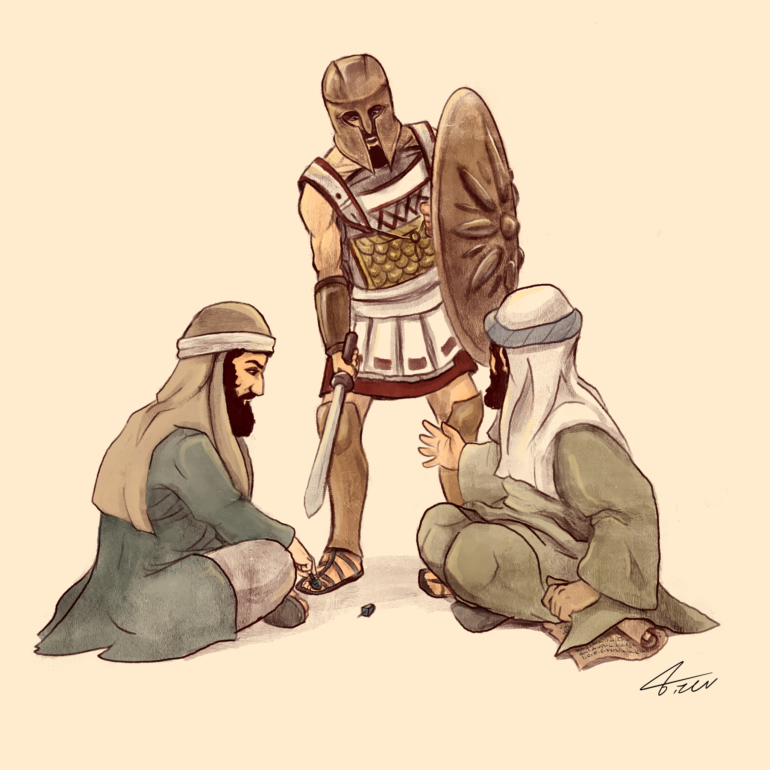
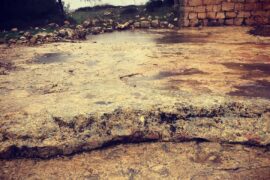
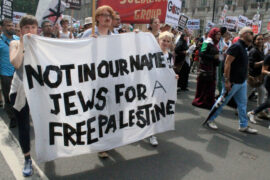
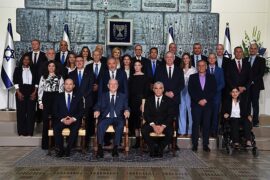
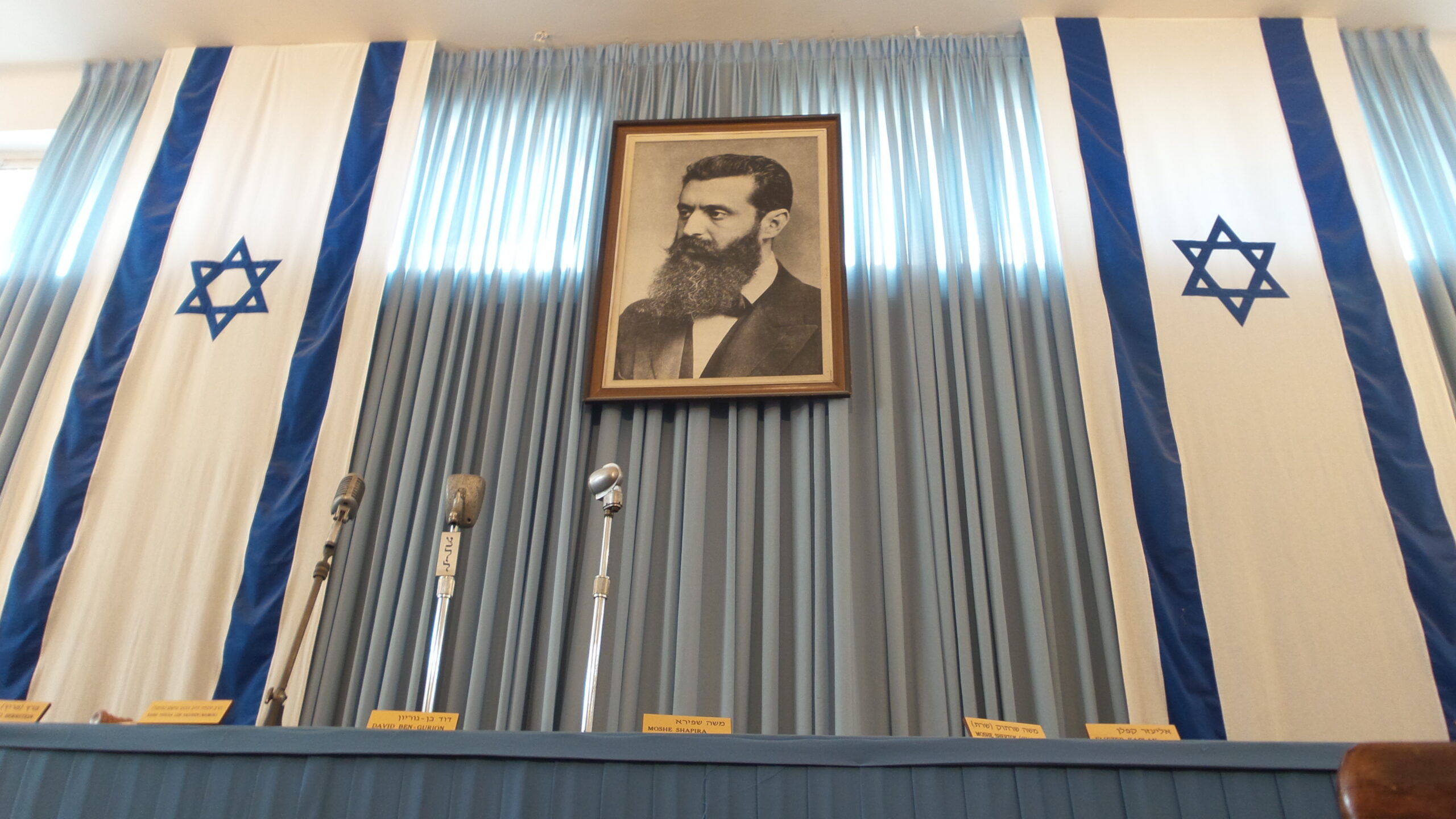
I enjoy your presentation on the Book of Maccabees.